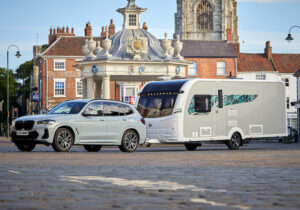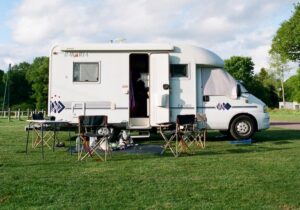CaravanTimes’ very own Dan Cartwright has been a judge for the Caravan and Motorhome Club’s Towcar of the Year (TCOY) awards on several occasions. One of the things he noticed at the week-long testing for 2023’s submissions was just how many electric cars had been put forward for the prize.
A shift in attitudes towards electric vehicles
There’s been a shift from the idea that electric vehicles can’t be towcars and this is demonstrated in both the manufacturers’ attitudes and those of the buying public. The general opinion is there’s no longer so much to mark them apart from traditional petrol or diesel cars.
Dan said: “Over the last four or five years there’s been a huge increase in the number of pure electric vehicles submitted to Towcar of the Year. Now, whilst electric vehicles on the whole have come a long way, they’ve got some very positive things when it comes to towing and some negative things.
“We are starting to see, on campsites around the country, electric vehicles being used as towcars. Being at Towcar of the Year gave us an opportunity to give some of our thoughts on them. Firstly, I think we have to address the range issue. There is no definitive answer for range.”
Effect of towing on range
Range is the metric used to measure how far an electric vehicle can travel without the need to be recharged. It’s an anxiety that many people have when contemplating buying an electric vehicle and one that is only exacerbated once you start thinking about attaching a caravan to the back of the car.
Dan added: “What a lot of people don’t realise is that MPG is not accurate. It’s done under certain tests, but when you get your car yourself, even on the same road on a different day, your MPG will vary. There is no benchmark as to how much towing will affect the range of your vehicle, but it will decrease dramatically.
“The thing to bear in mind here is the range on your petrol or diesel car also reduces dramatically when you tow. The range from your tank of petrol or your MPG can be more than halved when you’re towing. So, this isn’t a symptom of an electric vehicle so much as a symptom of towing.
Electric vehicles make great towcars
Dan commented: “Make no mistake, leaving range out of it, electric cars, on the whole, make incredible tow vehicles for a number of reasons. The first is for weight. Because of the battery, they are typically heavier, but that weight is distributed lower and more evenly around the car. Typically the whole floor plan of the car is a battery, so that means it’s a lot more stable for towing.
“There’s a lot less body roll into corners when you’re towing, as the caravan can push while the car’s leading a bit, particularly on the big 4x4s, which can be unpleasant. Additionally, most electric cars are four-wheel drive and electronically sensored, which means that the power delivery to each individual wheel is instantaneous, depending on its level of traction and the design acceleration.”
This has a number of benefits, including:
- Reducing wheel spin
- Improved performance on hill starts
- Better traction
- Increased stability
“The third main advantage is there’s a huge amount of instant torque. There’s no revs; all the power is available. So that makes going up very big hills, in the Alps for example, or wherever you want to go, just incredible. With a normal engine you’re constantly up and down through the gears trying to keep the engine delivering at its maximum peak output,” Dan told us.
“On the whole, class by class, for pure towing stability and ability, the electrics generally outclass their diesel compatriots, manufacturer by manufacturer. We have had electric vehicle class winners in previous years, but we haven’t had that many submitted.
“But there’s been a lot there to test this year and a lot of them have been from mainstream manufacturers as well. They are submitting competitive electric vehicles alongside their petrol and diesel equivalents.”
Electric vehicle towing is achievable with a little bit of extra planning
Using an electric vehicle as a towcar means thinking about your journeys in a different way. It’s about planning ahead and understanding the constrictions you’re putting on yourself and your holiday.
Dan said: “It’s interesting to note they genuinely make very good towcars. Once you’ve accepted that the range is going to reduce, like it does on any vehicle that tows, it’s about your lifestyle.
“If you do want to do short tours, tow less distance or perhaps you really wanted an electric vehicle and you don’t have one at the moment because you tow, if you planned correctly, then it may take a little bit longer with the charging points, but your towing experience will be very good.
“And if you want an electric vehicle for the 90 per cent of the time that you drive it without towing versus the ten per cent of the time that you are towing, with the proliferation of charging points and access at campsites to charging points, it is becoming more achievable with a little bit of extra planning,” he added.
Electric vehicles at Towcar of the Year and beyond
Seeing manufacturers entering more electric vehicles into the Caravan and Motorhome Club’s Towcar of the Year competition is a reflection of what’s going on in the wider world. Holidaymakers who tow are starting to gain more confidence in the technology and how far it can take them.
Dan told us: “CAMC TCOY 2023 had the biggest selection of electric tow cars rigged with fully weighted caravans that I have tested. Having the electric vehicles right next to their internal combustion counterparts and being able to test them all in the same way has shown me not only how far electric tow vehicles have come but also highlighted areas where they are better than internal combustion vehicles.”
We’ve come a long way since then and electric vehicles are becoming ubiquitous, with Dan stating: “We’re also seeing electric cars on campsites now.” And that’s what the awards are all about – testing the vehicles that will work well for caravanners on the road and when they pitch up.
Photo credit: Unsplash/CHUTTERSNAP




